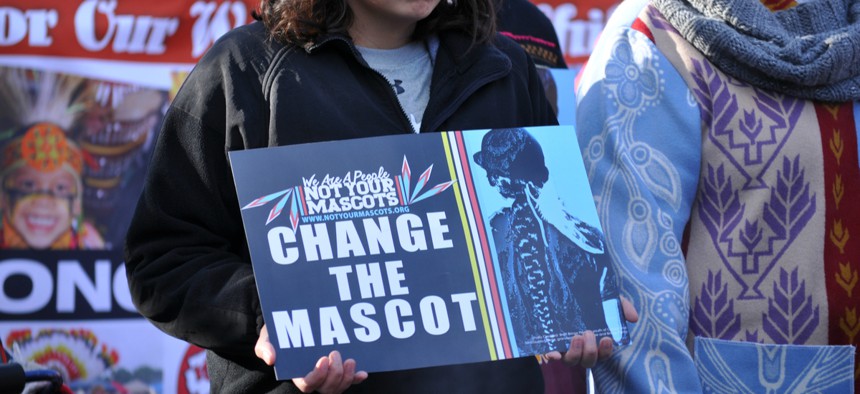Two States Could Discourage Getting Rid of Native Mascots

Protests against Native mascots have risen up across the country in recent years, like this one Minnesota from 2014. Shutterstock

Connecting state and local government leaders
Lawmakers in Utah and Idaho will consider measures that express support for Native mascots, urging schools to keep them.
School sports teams across the country are ditching Native American mascots and imagery following decades of organizing work by indigenous activists. In 2019, Maine became the first state to ban the use of Native imagery in its public schools and colleges, while similar bills have been introduced in several other states.
But two Republican state lawmakers say they don’t want states pressuring local governments and public schools to change their mascots and team names. Identical resolutions in Utah and Idaho argue that Native American mascots “can be authentic, appropriate, and accurate when used carefully with cultural sensitivity.”
The Utah bill has been introduced by state Rep. Rex Shipp, and identical legislation is pending in Idaho, to be introduced by state Rep. Chad Christensen.
The resolutions, which are nonbinding, state that the legislature supports the “appropriate use” of Native American symbols by schools or local governments unless “there is a consensus amongst the affected individual Native American or other indigenous people that a name, image, or symbol should be removed.”
Christensen said he began thinking about the issue when a school board in his district last year voted to retire the “Redskins” mascot of a local high school. Alumni of the school contacted Christensen asking for help. “Constituents in that county have generations of heritage there,” he said. “It’s been a source of pride, there’s no racial prejudice motivation at all.”
Christensen said that changing mascots is a minor issue when there are “more important things to deal with” in education than “tearing up gym floors and repainting.” Specifically, Christensen mentioned the Idaho’s high suicide rate as something schools should focus on.
Neither Christensen nor Shipp consulted with tribal government leaders in their states on their proposals, but Christensen said that he talked to individual Native Americans. Shipp did not return a request for comment, but told KUER that he too had spoken with individual tribal members.
Tamra Borchardt-Slayton, chairperson of the Paiute Indian Tribe of Utah, said that Shipp reached out after the legislation became public and the tribal government plans to meet with him next week. “He’s a representative for our district and he failed to reach out to us,” she said. “There are formal governments and Rep. Shipp needs to be aware that there is a way to consult with tribes."
The Paiute tribe has already asked Shipp to withdraw his resolution.
Similarly, tribes in Idaho have criticized Christensen’s bill. Darren Perry, chairman of Northwestern Band of the Shoshone Nation in Idaho, spoke at a rally against the resolution. “So let me get this straight,” he said. “After you murdered us on a genocidal scale, stole our lands, spread disease and decay among us, stole our children and sent them to boarding schools to be assimilated, forced sterilization upon our women, didn’t allow Native Americans in their own country to vote and destroyed our economics, you now want to honor our spirit by naming sports teams after us? Wow, we are so honored.”
Christensen said he and Rep. Shipp in Utah drafted the legislation with the Native American Guardian’s Association, a group that describes its members as Native Americans who support the use Native mascots. Per their website, the group says that they oppose mascots “in the stereotypical sense of a ‘sideline cheerleader’ … [or] an overtly ‘cartoonish’ logo,” but are not opposed to Native imagery being used “to promote education through … respectful use.”
For Christensen, the line on what is offensive is if a school uses a Native mascot in costume, out on a field cheering on a team. He called that “disrespectful.”
“But the school and the name and the logo is appropriate,” he added.
In Utah, the Paiute Tribe released a statement saying that NAGA does “not speak for, or on behalf” of the tribe. “We do not view this group as a credible group to advocate on behalf of our tribe and actively encourage the public to disregard any statements made by NAGA,” the statement reads.
NAGA did not return a request for comment.
Christensen said he has seen polls of Native Americans asking their opinions on mascots and team names, which have shown the majority of those surveyed were not offended.
Leaders in the Native community have condemned polls that seek to determine if mascots or team names like like “Redskins” or “Redmen” are offensive. In 2013, Louis Gray, president of the Tulsa Indian Coalition Against Racism, said that polling was insulting. “Why would you take a poll to see if something is racially offensive?” he said. “You wouldn’t do that with any other race. You wouldn’t have African-Americans vote to decide whether or not any sort of racial epitaph would be offensive.”
The National Congress of American Indians has also condemned polling. In a 2019 statement, Kevin Allis, CEO of the NCAI, said that polls are flawed because they often ask people to self-identify as Native American, something pollers can’t confirm. “It proves nothing … The fact is that hundreds of tribal nations and Native organizations representing hundreds of thousands of Native people across this country are on record formally opposing the continued use of harmful ‘Indian’ themed mascots.”
Borchardt-Slayton, of the Paiute Tribe in Utah, said that mascots take a psychological toll on Native youth. “Utah has one of the highest suicide rates in the nation and Native Americans are particularly prone to suicide,” she said. “The American Psychological Association has recommended getting rid of mascots. I think they’re harming Native Americans and the general student population.”
Emma Coleman is the assistant editor for Route Fifty.
NEXT STORY: Taking on AI bias





